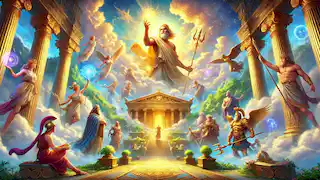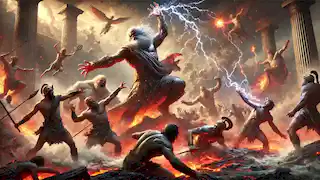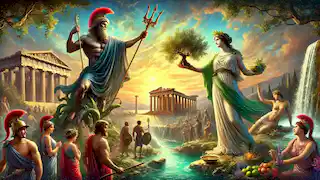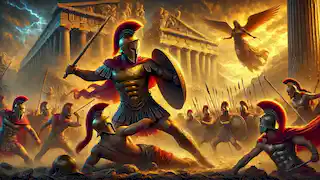The Legend of the Olympian Gods
Reading Time: 6 min

About Story: The Legend of the Olympian Gods is a Myth from greece set in the Ancient. This Dramatic tale explores themes of Good vs. Evil and is suitable for All Ages. It offers Cultural insights. The timeless saga of the Olympian gods, where power, passion, and destiny collide.
In the ancient land of Greece, where mountains kissed the sky and the seas whispered secrets of the deep, the Olympian gods ruled both heaven and earth. These immortal beings were at once majestic and flawed, embodying the full spectrum of human virtues and vices. Their tales of love, war, betrayal, and redemption shaped the lives of mortals and defined the fabric of the cosmos. This is the saga of their rise, their reign, and their enduring legacy. Before Olympus graced the heavens, the cosmos was in turmoil. The primordial beings Gaia (Earth) and Uranus (Sky) bore the Titans, a race of powerful entities who dominated existence. Among them, Cronus rose to power, but his reign was shadowed by fear. An oracle foretold that one of his children would overthrow him. To thwart fate, Cronus devoured his offspring as soon as they were born. His wife, Rhea, heartbroken and desperate, devised a plan to save her youngest child, Zeus. Swaddling a stone in cloth, she presented it to Cronus, who swallowed it without question. Meanwhile, the infant Zeus was spirited away to a hidden cave on Mount Ida in Crete. There, nymphs and the goat Amalthea nurtured Zeus until he grew into a formidable young god. Determined to fulfill his destiny, Zeus sought allies among the Titans who opposed Cronus. Metis, a cunning Titaness, gave him a potion that caused Cronus to vomit his siblings: Hades, Poseidon, Hera, Demeter, and Hestia. Together, they declared war on the Titans. For ten years, the earth quaked with the fury of their battle. Zeus wielded thunderbolts, Poseidon unleashed tidal waves, and Hades summoned the shadows of the underworld. Victory came when Zeus freed the Cyclopes, who forged powerful weapons for the Olympians. With these tools, the Titans were defeated and imprisoned in Tartarus, and the age of the Olympian gods began. The Olympians built their realm on Mount Olympus, a towering peak shrouded in clouds and mystery. Its golden halls and lush gardens became the divine seat of power, where each god assumed a domain reflecting their essence. - Zeus, the ruler of gods and men, governed the skies and upheld justice. - Hera, his queen, presided over marriage, often with a jealous and vengeful eye. - Poseidon, the tempestuous god of the seas, commanded oceans, earthquakes, and storms. - Hades, grim and stoic, ruled the underworld, where mortal souls found their eternal rest. - Demeter, gentle yet fierce, nurtured the earth’s bounty and guarded the seasons. - Athena, born from Zeus's forehead, became the embodiment of wisdom and war strategy. - Apollo, radiant and artistic, presided over the sun, music, and prophecy. - Artemis, his twin sister, roamed the forests as the goddess of the hunt and the moon. - Ares, fierce and bloodthirsty, represented the chaos of war. - Aphrodite, enchanting and capricious, embodied love, beauty, and desire. - Hephaestus, deformed but ingenious, forged divine weapons and crafted wonders. - Hermes, swift and clever, served as the messenger of the gods and guide to lost souls. The gods were powerful but not without fault. Their rivalries and passions often led to cosmic upheaval, weaving stories that resonated through the ages. Zeus’s ascension to power marked the beginning of a new order, but not all Titans accepted their defeat. Prometheus, a Titan of foresight, allied himself with the Olympians but soon clashed with Zeus. When Prometheus defied Zeus by gifting fire to humanity, he was punished by eternal torment, bound to a rock as an eagle devoured his liver daily. Prometheus's defiance symbolized humanity's quest for freedom and knowledge, themes central to Greek mythology. Zeus’s numerous affairs incited Hera’s legendary jealousy. Her vengeance extended to mortals and demigods alike. When Zeus fathered Heracles with a mortal woman, Alcmene, Hera sought to destroy the child. Sending serpents to his crib, she was thwarted by the infant’s strength. Heracles grew into one of the greatest heroes, completing twelve labors to atone for Hera’s inflicted madness. Athena and Poseidon vied for the patronage of a new city. Poseidon struck the ground with his trident, summoning a saltwater spring. Athena planted the first olive tree, symbolizing peace and prosperity. The citizens chose Athena, naming their city Athens in her honor. Poseidon’s grudge against the city endured, causing frequent maritime disasters. Hades’s desire for companionship led him to abduct Persephone, Demeter’s beloved daughter. Distraught, Demeter withdrew her blessings, plunging the earth into famine. Zeus intervened, decreeing that Persephone would spend half the year with Hades and half with Demeter. This cycle explained the seasons, with spring and summer marking Persephone’s return and autumn and winter her descent. The gods often manipulated mortals, whether as pawns in their disputes or as instruments of fate. These interactions birthed heroes whose deeds transcended time. The Trojan War exemplified the gods’ meddling in mortal affairs. It began when Eris, the goddess of discord, tossed a golden apple inscribed “To the Fairest” among Hera, Athena, and Aphrodite. The mortal prince Paris judged Aphrodite the fairest, earning her favor and the love of Helen, queen of Sparta. This act sparked a decade-long war where gods and mortals clashed in epic battles. After the Trojan War, Odysseus faced trials orchestrated by vengeful gods. Poseidon, angered by Odysseus’s arrogance, cursed him to wander the seas for ten years. Guided by Athena, Odysseus outwitted mythical beasts, from the Cyclops Polyphemus to the sirens, before reclaiming his throne in Ithaca. As centuries passed, the gods’ influence waned. Philosophers like Socrates and Plato sought rational explanations for the cosmos, and new religions offered alternative paths to salvation. Yet, the Olympians lived on through art, literature, and the collective memory of humanity. The Olympian gods remain timeless symbols of power, passion, and fallibility. Their tales resonate with universal themes, bridging the gap between human and divine. Through their stories, we explore the complexities of existence and the enduring quest for meaning.The Birth of the Olympians
The Rise of Mount Olympus

Divine Feuds and Fateful Tales
The Betrayal of Cronus
Hera’s Wrath
Athena and Poseidon’s Contest
The Abduction of Persephone

Mortal Champions and Divine Schemes
The Trojan War
Odysseus’s Trials

The Decline of the Gods
Legacy of the Olympians


















